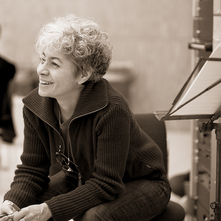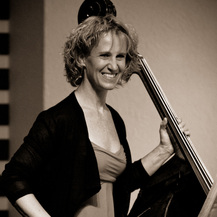Dominique Le Gendre on Jab Molassie
and the collaboration with Caitlyn Kamminga

As a composer it has been my dream to collaborate with a musician who is genuinely musically multi-lingual and multi-cultural. It has also been my dream to find the right music-theatre vehicle to introduce my musical language combined with the unique Trinidadian performance style and performers to Trinidad and to the world.
Caitlyn Kamminga’s Trinidadian adaptation of Charles Ramuz’ libretto, “The Soldier’s Tale” presents a perfect opportunity for a collaboration between a composer and librettist/musician from rich combinations of musical and cultural worlds that can open international doors and ears to Musical High-Art Trinidadian style.
The Chamber instrumentation of the piece is a journey through Trinidad’s musical history. The vocal and performance languages and styles trace our multicultural lineage across continents to our own unique language. Jab Molassie, its process and creations, is a vital living example of Trinidad at its best. That’s why this piece is important.
In our setting in Laventille we want to get beyond the perception of its use as good scenery/backdrop. Our task then is to capture with just the right and concentrated combination of words, sounds and images what the world of Laventille means, but also show that Laventille is actually everywhere in Trinidad, indeed, that Jab Molassie is a universal human story.
I've also become aware of my multiple perspectives of standing in Trinidad creating something and parallel to this in London creating something. In Trinidad we combine intensity of absolutely everything: smells, tastes, texture, colour, words, sounds, emotions and sensations with a lightness of touch that nevertheless conveys the seriousness, respect and reverence of the thing itself being created. Everything is immediate.
Caitlyn Kamminga’s Trinidadian adaptation of Charles Ramuz’ libretto, “The Soldier’s Tale” presents a perfect opportunity for a collaboration between a composer and librettist/musician from rich combinations of musical and cultural worlds that can open international doors and ears to Musical High-Art Trinidadian style.
The Chamber instrumentation of the piece is a journey through Trinidad’s musical history. The vocal and performance languages and styles trace our multicultural lineage across continents to our own unique language. Jab Molassie, its process and creations, is a vital living example of Trinidad at its best. That’s why this piece is important.
In our setting in Laventille we want to get beyond the perception of its use as good scenery/backdrop. Our task then is to capture with just the right and concentrated combination of words, sounds and images what the world of Laventille means, but also show that Laventille is actually everywhere in Trinidad, indeed, that Jab Molassie is a universal human story.
I've also become aware of my multiple perspectives of standing in Trinidad creating something and parallel to this in London creating something. In Trinidad we combine intensity of absolutely everything: smells, tastes, texture, colour, words, sounds, emotions and sensations with a lightness of touch that nevertheless conveys the seriousness, respect and reverence of the thing itself being created. Everything is immediate.
Caitlyn Kamminga on Jab Molassie
and the collaboration with Dominique Le Gendre

What drew me to L’Histoire du Soldat as the starting point for an adaptation was its universal story. Underlying it is the Biblical text, “What shall it profit a man if he gain the whole world, and lose his own soul?” Like Shakespeare’s plays, which have been set in every country, language and age, this story is relevant in every society.
Artists know by trade that it is better to show than to tell. By setting the story in Trinidad and using Carnival as the backdrop, we have some fairly spectacular ways of showing the fact that, as Andrew Porter* states so eloquently, “In real life, it is not so much a matter of gaining ‘the whole world’ as of the day-to-day decisions when we are tempted to compromise between ideals and ease or expediency-to do something that instinct says is not quite right for the sake of quick reward.”
The decision to ask Dominique Le Gendre if she would be interested in collaborating on this project was an easy one and I am absolutely thrilled that she has agreed. She is a classically trained, successful composer living and working in London, who grew up in a Trinidad that did not offer a tertiary education in the arts at the time. The combination of her roots in Trinidad, my roots in New Orleans, our exposure to African rhythms, jazz and carnival, as well as our classical training combine to make the perfect partnership to create a relevant piece of musical theatre.
We also both firmly believe in an education based on arts integration, that art and music should be for everybody and, when built into a school curriculum, can raise test scores, help create well-rounded, compassionate individuals, who know how to work together. The educational opportunities for a portable show such as this are myriad.
*An excerpt from Andrew Porter’s program notes on L’Histoire du Soldat. Appears on publisher Chester Novello website.
Artists know by trade that it is better to show than to tell. By setting the story in Trinidad and using Carnival as the backdrop, we have some fairly spectacular ways of showing the fact that, as Andrew Porter* states so eloquently, “In real life, it is not so much a matter of gaining ‘the whole world’ as of the day-to-day decisions when we are tempted to compromise between ideals and ease or expediency-to do something that instinct says is not quite right for the sake of quick reward.”
The decision to ask Dominique Le Gendre if she would be interested in collaborating on this project was an easy one and I am absolutely thrilled that she has agreed. She is a classically trained, successful composer living and working in London, who grew up in a Trinidad that did not offer a tertiary education in the arts at the time. The combination of her roots in Trinidad, my roots in New Orleans, our exposure to African rhythms, jazz and carnival, as well as our classical training combine to make the perfect partnership to create a relevant piece of musical theatre.
We also both firmly believe in an education based on arts integration, that art and music should be for everybody and, when built into a school curriculum, can raise test scores, help create well-rounded, compassionate individuals, who know how to work together. The educational opportunities for a portable show such as this are myriad.
*An excerpt from Andrew Porter’s program notes on L’Histoire du Soldat. Appears on publisher Chester Novello website.

